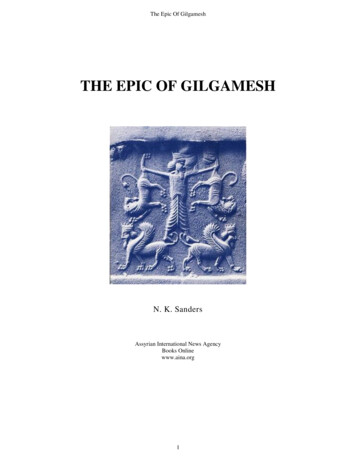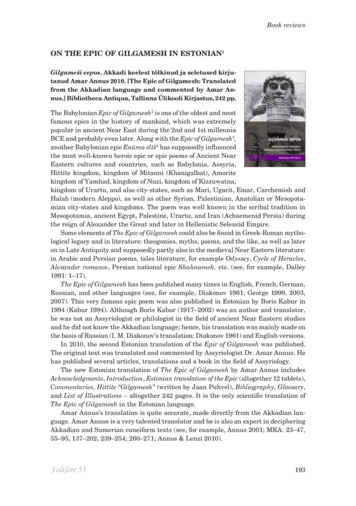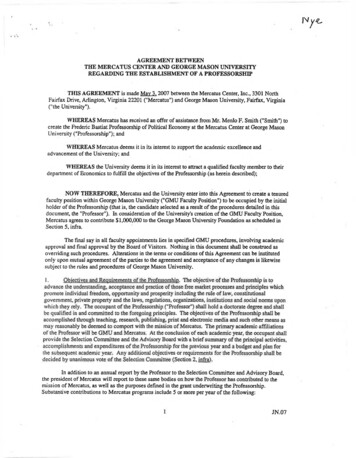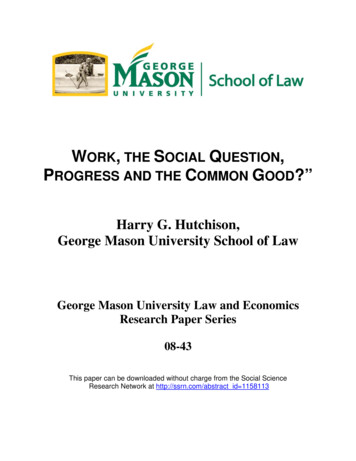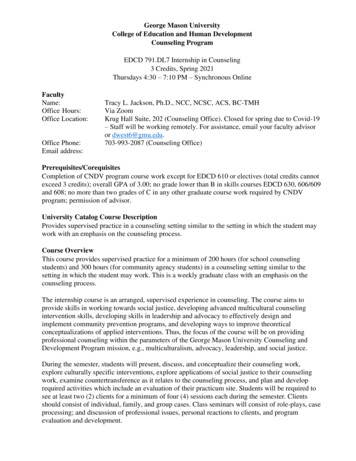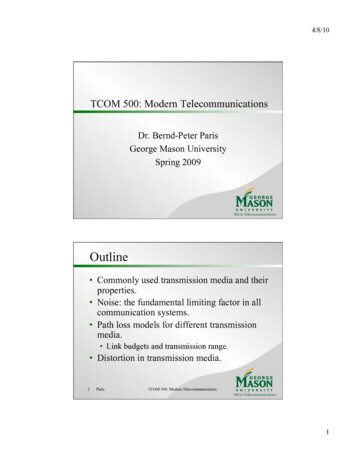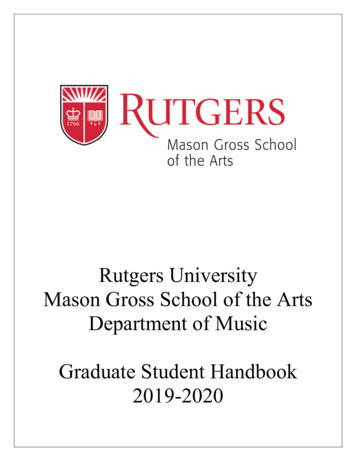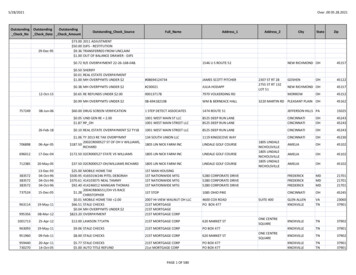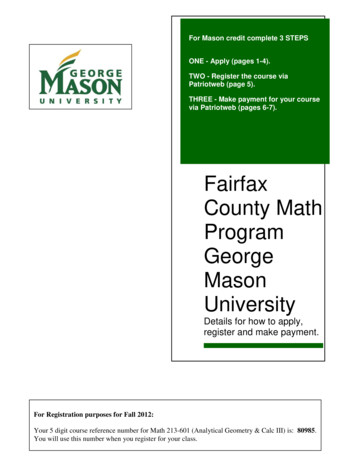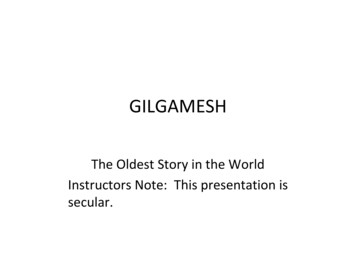
Transcription
GILGAMESHThe Oldest Story in the WorldInstructors Note: This presentation issecular.
Gilgamesh Note: Readings in the Slides refer toGilgamesh: A New English Version.Translator Stephen Mitchell. 2004 TheFree Press: A Division of Simon andSchuster. ISBN-13978-0-7432-61692(Pbk)2
3
Deep Roots Neanderthal graves containing weapons, toolsand the bones of a sacrificed animal suggestthey had some kind of belief in a future worldsimilar to their own. Humans are meaning, sensing creatures. Theyhave invented stories that enabled us to placeour lives in a larger setting. The human mind has the ability to have ideasand experiences that we cannot explainrationally.4
5
Deep Roots 2 Imagination produces mythology and religion,to invent new technology and to live moreintensively in this world. Neanderthal graves tell us important thingsabout myth. Myths are nearly always rootedin the experience of death and the fear ofextinction. Burial was accompanied by sacrifice.Mythology is usually inseparable from ritual.6
Deep Roots 3 Myth is about the unknown. The mostpowerful myths force us to go beyond thelimits of human experience. Myth is not a story told for its own sake. Itshows us how we should behave. A belief in the invisible but more powerfulreality, sometimes called the world of thegods, is a basic theme.7
8
GilgameshThe Oldest Story in the World The world was starting to change fromhunting and gathering to cultivatedagriculture. Population gains depleted game, peoplelearned how to irrigate, to plant seeds ofgrain and how to avoid starvation bystoring harvested crops.9
Gilgamesh Story The Epic of Gilgamesh is an ancient poem fromMesopotamia (present day Iraq) and is amongthe earliest known works of literature. It is athousand years older than the Iliad or theBible. It likely originated as a series of Sumerianlegends and poems about the hero king, whichwere fashioned into a longer Akkadian epicmuch later.10
Gilgamesh Tablets The earliest Sumerian Gilgamesh poems arenow considered to be distinct stories ratherthen constituting a single epic. They date fromthe Third Dynasty of Ur (2150-2000 BCE). The earliest Akkadian versions of Gilgamesh aredated to the early 2nd millennium, most likely inthe 18th or 17th century BCE, when one or morescholars used existing library material to formthe epic. The “standard” Akkaidian version consistingof 12 tablets was edited by Sin-liqe-unninnisometime between 1300 and 1000 BCE.11
Gilgamesh Tablets 2 As of now, with 73 fragments discovered,slightly fewer than 2,000 of the 3,000 lines ofthe original text exist in readable, continuousform; the rest are damaged or missing, andthere are many gaps in the sections thatsurvived. The tablets were found in the ruins of thelibrary of Ashurbanipal, last great king of theNeo‐Assyrian Empire, 668 – ca. 627 BCE inNineveh. Ashurbanipal established the firstsystematically organized library in the ancientMiddle East.12
Gilgamesh Tablets 3 The library yielded tens of thousands ofclay tablets that had been buried for 2000years until their discovery in 1844 inMosul, Iraq the site of the ancient city ofNineveh, capital of Assyria.13
Gilgamesh Story The semi-mythical king or king-priestGilgamesh, according to the chronologypresented in the Sumerian king list, ruledSumer from it’s capital Uruk in the 26thcentury BCE. Uruk, which saw a swift change from asmall agricultural village (4000-3200 BCEto a larger urban center with a full timebureaucracy, military and stratified society.14
15
Uruk Uruk was located in the alluvial plain areaof southern Mesopotamia. Through the gradual and eventualdomestication of native grains from theZagros foothills and extensive irrigationtechniques, the area supported a vast variety ofedible vegetation.16
17
18
Garden of Eden The Eden motif itself, and the biblical tale of theflood date back at least to the civilization of Sumer andperhaps 5000 to 6000 BCE. Edin is the Sumerianword for an uncultivated plain, and simply describeslowland geography like the present-day southeastIraq where the Tigris and Euphrates meet. ProfessorZarins and other experts believe that the Garden ofEden lies presently under the waters of the PersianGulf, and they further believe that the story of Adam andEve in—and especially out—of the Garden of Eden is ahighly condensed and evocative account of the shiftfrom hunting and gathering to agriculture.19
Uruk 2 Evidence from evacuations including extensivepottery and the earliest known tablets of writingsupport Uruk as a center of agriculturalsurplus, trade, specialization of crafts and theevolution of writing. At its height c. 2900 BCE, Uruk probably had50,000 to 80,000 residents living in four squaremiles of walled area, the largest city in theworld at the time.20
Cuneiform Script The earliest know writing system in the world. Cuneiform writing emerged in the Sumeriancivilization of southern Iraq around 34th centuryBCE during the middle Uruk period, beginningas a pictographic system of writing. Clay tokens had been used for some form ofrecord-keeping in Mesopotamia since perhapsas early as c. 8,000 BCE, according to someestimates. Cuneiform documents were writtenon clay tablets, by means of a reed stylus.21
Cuneiform scipt22
Epic Poetry, Ancient Mesopotamia Epic poetry is a lengthy narrativepoem concerning details of heroicdeeds and events significant to aculture or nation. Oral poetry can qualify and makes itfeasible to remember and pass alongmythologies and stories fromgeneration to generation.23
Gilgamesh: The Story The story revolves around a relationshipbetween Gilgamesh and his close companion,Enkidu. Enkidu is a wild man created by the gods asGilgamesh’s equal to distract him fromoppressing the citizens of Uruk. Together they undertake dangerous queststhat incur the displeasure of the gods.24
Gilgamesh: The Story 2 First, they journey to the Cedar Mountain todefeat Humbaba, its monstrous guardian. Theykill Humbaba, against the will of the gods. Later they kill the Bull of Heaven that thegoddess Ishtar has sent to punish Gilgamesh forspurning her advances. The latter part of the epic focuses onGilgamesh’s distressed reaction to Enkidu’sdeath, which takes the form of a quest forimmortality.25
Gilgamesh: The Story 3 Gilgamesh attempts to learn the secret ofeternal life by undertaking a long and perilousjourney to meet the immortal flood heroUtnapishtim. Ultimately the poignant words addressed toGilgamesh in the midst of his quest foreshadowthe end result: “That life that you are seekingyou will never find. When the gods createdman they allocated to him death, but eternal lifethey retained for their own keeping.”26
Prologue The prologue written by “Sin-liqe-unninni”tells of a hero’s journey with its hugeuninhibited mythic presences movingthrough a landscape of dream. Gilgamesh shows how a man becomescivilized, how he learns to rule himself andtherefore his people and to act withtemperance, wisdom and piety. The poem begins with the city and endswith it.27
PROLOGUE 69-7028
29
Book I Surpassing all kings, powerful and tall Two thirds divine, one third human But to begin with, he is manic and atyrant He oppresses young men, perhaps withforced labor or military service30
Book I Continued Oppresses the young women, perhapswith his ravenous sexual appetite. Because he is an absolute monarch, noone dares to criticize him. Gilgamesh, the man of unsurpassablecourage and inexhaustible energy, hasbecome a monster of selfishness.31
32
The people call out to heaven and theircry is heard Anu, father of the gods, asks the greatmother goddess Aruru to reenact her firstcreation of human beings:“Now go and create a double forGilgamesh, his second self,a man who equals his strength andcourage,33
Aruru Creates Enkidua man who equals his stormy heart,Create a new hero, let them balanceeach other perfectly, so that Uruk haspeace.” Thus begins—a thousand years beforeAchilles and Patroclus,—the first greatfriendship in literature. Aruru creates a man, a warrior, a hero;Enkidu the brave and fierce, friend of theanimals.34
35
The Trapper Complains A trapper complains to Gilgameshabout the wild man, Enkidu who livesamong the animals, eats grass withthe gazelles, and when he is thirstyhe drinks clear water from thewaterholes.36
Enkidu Where Gilgamesh is arrogant, Enkiduis childlike; where Gilgamesh isviolent, Enkidu is peaceful, a nakedherbivore among the herds. He is the original animal activist,setting his animal friends free fromhuman pits and traps.37
38
Shamhat Shamhat, Ishtar’s priestess, leads Enkiduinto the glories of sexuality, the intimateunderstanding of what a woman is andself-awareness as a human being. There is no serpent in this garden, noanxious deity announcing prohibitions andpunishments.39
Enkidu In knowing Shamhat sexually, his mindhas been enlarged, he has begun to knowhimself. He can understand human language;Shamhat gives him human clothing,teaches him to eat human food, acts as apatient, loving mother and guides himthrough rites of passage.40
Shamhat andEnkidu Shamhat: “Let me take you to great –walled Uruk, to the temple of Ishtar, to thepalace of Gilgamesh the mighty king, whoin his arrogance oppresses the peopletrampling upon them like a wild bull.”41
42
Book II Enkidu and Shamhat travel to Uruk. Enkidu’s heart sang with joy and he becamefully human. He had his hair cut. Enkidu meets a man who was on his way to awedding. The man indicates the priest will bless the youngcouple, but Enkidu learns it is Gilgamesh, kingof the great-walled city Uruk who mates firstwith the lawful wife. This is the order the godshave decreed.43
Book II continued Enkidu’s face went pale with anger. Iwill challenge him! He stood like a boulder at the door of thebride. Gilgamesh and Enkidu fought likewild bulls, doorposts trembled, theycareened through the streets. Finally Gilgamesh threw the wild man andwith his right knee pinned him to the ground.Gilgamesh’s anger left him.44
Book II Continued 3 Enkidu said to Gilgamesh: “Your mother,the goddess Ninsun, made you strongerand braver than any mortal. You aredestined to rule over men.”They embraced and kissed. They heldhands like brothers.They walked side by side. Theybecame true friends.45
Book II Continued 4 Gilgamesh knows that what he dreamedhas come true. The dear friend and mighty hero hasappeared, the longed for companion of hisheart, the man who will stand at his sidethrough the greatest dangers.46
Books III to V Time passed quickly. Gilgamesh and Enkidu became truefriends. Uruk can have peace. The sons canreturn to their fathers, the young womencan return to their mothers. For the timebeing, all’s right with the world.47
Books III to V Out of the blue, Gilgamesh says“Now we must travel to the CedarForest,where the fierce monster Humbabalives.We must kill him and drive evil fromthe world.”48
Books III to V Thus begins the fatal adventure thatprovides the shape for the rest of the epic:an ascent to an ambiguous victory,followed by a plunge into death,unassuageable grief, and the futilesearch for immortality. We do not know the reason for thepreemptive attack.49.
Books III to V Ancient readers, like many contemporaryAmericans, would have considered it to beunquestionably heroic.50
51
Fame and Legacy But the poem leaves us with no moralcertainties or solid ground to stand on. The desire for fame is at the heart of theancient heroic traditions, Babylonian,Greek, Germanic. It is one of the noblerdelusions, and it can produce great art—and great havoc.52
Fame and Legacy 2 Human nature hasn’t changed much fromGilgamesh—or Enkidu to the current time. The poet makes it impossible to see Humbabaas a threat to the security of Uruk or as part ofany “axis of evil.” It is all too easy to see ourselves fighting on theside of the gods and to justify preemptiveattacks.53
Fame and Legacy 3 Projecting evil onto the world makes meunassailably right—a position as dangerous inpolitics as in marriage. The goddess Ninsun mentions Gilgamesh’s“restless heart.” What Pascal, 17th centuryFrench mathematician and philosopher, calledthe cause of all human misery: The inability tosit contentedly alone in a room.54
Fame and Legacy 4 Book IV. They walk east, in three-daymarches. It is no disgrace to feel fear.Gilgamesh is frozen in his tracks butEnkidu urges him not to retreat and theywalk on to the monster’s den in theCedar Forest. Book V. The battle is over quickly.Humbaba is about to overwhelm the twoheroes.55
56
Fame and Legacy 5 Shamash, the sun god and god of justice,sends mighty winds that pin Humbabadown and paralyze him. Shamash wantsHumbaba defeated but not destroyed. Humbaba begs both heroes for mercy.Gilgamesh hesitates; Enkidu has nodoubts, even though he is aware thatkilling Humbaba will enrage not only Enlil,chief deity, Lord of the Open, Lord of theWind, but their own protector Shamash aswell.57
Enkidu said:“Dear friend, quickly before anothermoment goes by, kill Humbaba, don’tlisten to his words, don’t hesitate,slaughter him, slit his throat, before thegreat god Enlil can stop us.Before the great gods can get enraged,Enlil in Nipper, Shamash in Larsa.Establish your fame, so that forevermen will speak of brave Gilgamesh,who killed Humbaba in the Cedar Forest.”58
Fame and Legacy 6 Enkidu is morally responsible forpersuading his friend not to spare themonster’s life; therefore his own lifebecomes forfeit. When Gilgamesh kills Humbaba, the poetsays, “a gentle rain falls unto themountains, as if the heavensthemselves are weeping for theconsequences of that act.”59
Book VIIDeath and Departure Enkidu dream one, they have offended thegods, one must die. Enkidu Page 141-14260
61
Book VIIDeath and Departure Enkidu dream two, how Mesopotamiansimagine the dead. The day that Enkidu had his dreams, hisstrength began failing. For twelve longdays he was deathly sick. When he heard the death rattle,Gilgamesh wept.62
Book VIII Grief Gilgamesh’s lament: “My beloved friend is dead, he is dead,my beloved brother is dead, I will mournas long as I breathe, I will sob for himlike a woman who has lost her only child. Beloved friend, swift stallion, wild deer,leopard ranging in the wilderness—together we crossed the mountains, togetherwe slaughtered the Bull of Heaven, we killedHumbaba, who guarded the Cedar Forest.”63
Book VIII Grief Gilgamesh as a great warrior has seenand caused many deaths. But now for thefirst time, death is an intimate reality, andhe can barely recognize it.64
Gilgamesh and Grief Finally, it’s over. He goes through all thenecessary rituals to ensure that the godsof the underworld will welcome Enkidu andhelp him to “be peaceful and not sick atheart.” This is poor comfort. So abandoning all hisprivileges and responsibilities, Gilgameshputs on an animal skin and leaves thecity. He feels compelled, like Buddha, tosearch for the secret of life and death.65
Searching He searches for Utnapishtim, whom thegods made immortal. At the edge of theocean after days of hardship and roamingthe tavern keeper Shirduri advises that hewill never find the eternal life. Page 16816966
67
68
Book IX Gilgamesh Searching Fear is the reverse of the cool warriorethos. “Our days are few in number,”Gilgamesh had said, imperturbably.“Why be afraid then, / since sooner orlater death must come?” Why indeed? Love has changed everything; it has madeGilgamesh absolutely vulnerable. Hethought he knew that only the gods liveforever. “Must I die too?”69
Book X Gilgamesh Searching Gilgamesh wants to find one exceptionto the rule of mortality, his ancestorUtnapishtim, who joined the assembly ofthe gods and was granted eternal life anddwells somewhere at the edge of theeastern world. There may be a secondexception. A long run through 12 hours of darkness. He is standing face to face with the manwho is his last hope. The old and wiseUtnapishtim listens and says:70
71
72
XI. When there is no way out, youjust follow the way in front of you The wise man says Gilgamesh should realizehow fortunate he is, that life is short and deathis final. Accept things as they are. But we can’t accept things as they are, so longas we think things should be different. But author Mitchell suggests, “There is noconsolation in platitudes, and for Utnapishtimto tell Gilgamesh that he is going to die seemsas tactless as it was for St. Paul to tell theThessalonians that they were not going to die.”73
When there is no way out 2 Utnapishtim proposes a test. If Gilgameshcan overcome sleep for seven days—sleep being the likeness of death—perhaps he will be able to overcomedeath, too. But Utnapishtim knows fromthe start that Gilgamesh, “worn out andready to collapse,” will fail the test andindeed he does. Gilgamesh sat there, with his chin on hisknees, and sleep overcame him, as itdoes all men.74
When there is no way out 3 Gilgamesh recognizes his failure on thetest.– “What shall I do, where shall I go now?Death has caught me, it lurks in mybedroom, and everywhere I look,everywhere I turn, there is only death?”75
A Return to the Beginning The opening lines of the poem point us: Itis clear that Gilgamesh has completed thefinal stage of the archetypal hero’sjourney, in which the hero gives new life tohis community, returning to them with thegifts he has discovered on his adventure.76
A Return to the Beginning 2“He brought back the ancient forgottenrites, restoring the temples that the floodhad destroyed.Renewing the statutes and thesacraments for the welfare of the peopleand the sacred land.”77
A Return to the Beginning 3 We know that for the first time he is actingas a responsible, compassionate king, abenefactor to his people and theirdescendants. Out of the depths, somehow Gilgameshhas managed to “close the gates ofsorrow;” he has learned to rule himselfand his city without violence, selfishnessor the compulsions of restless heart.78
A Return to the Beginning 4 Gilgamesh has become wise. He has absorbed the deeper wisdom ofthe poem’s narrative voice, a voice that isimpartial, humorous, civilized, sexual,irreverent, skeptical of moral absolutes,delighted with the things of this world andsupremely confident in the power of itsown language.79
80
81
Book VI The mystery of humiliating the goddess – howdoes it tie to the story. Book VI is a separable episode that could beomitted without any loss of continuity. It is acomic interlude, vulgar, high‐spirited,irreverent and rambunctious, letting looseenergies but with twists and some sense ofput‐downs of the feminine that seems out ofcontext.82
Book VI Almost all the female characters in Gilgamesh areportrayed as admirable: intelligent, generous,compassionate. The one exception is Ishtar, goddessof love and patron deity of Uruk, known inMesopotamian culture as Inanna, the Queen ofHeaven. She is rejected, insulted, threatened and humiliatedby both Gilgamesh and Enkidu. This is surprising in apoem that mentions her Eanna Temple in Uruk withreverence and makes one of her priestesses,Shamhat, a central character in the initial drama.83
Ishtar But there is another side. Ishtar is also the goddess of war, and shecan be selfish, arbitrary and brutal. We just do not know why the abusive portrayal of our heroes towardIshtar. Is it symptomatic of a religious movement among first theSumerians and later the Babylonians to displace her with a maledeity? Why the metaphorical insults, the catalogue of several black-widowaffairs in which she turned against her lover and harmed him? Is Gilgamesh’s response a frightened male reaction to a woman whotakes the sexual initiative?84
Ishtar 2 Is Ishtar a murderous spoiled brat, exploding with tears ofrage and frustration and throwing a tantrum until Anu lendsher the Bull of Heaven to kill Gilgamesh and destroy hispalace? The Bull of Heaven is the constellation we call Taurus. Gilgamesh and Enkidu easily kill the Bull of Heaven. Read Page 38, 39 40 Enkidu rips off one of the Bull’s thighs and flings it in Ishtar’sface; she has no one to avenge her.85
86
87
Stephen Mitchell on the Oldest Story inthe World Mitchell comments “Part of the fascination ofGilgamesh is that, like any great work ofliterature, it has much to tell us aboutourselves. In giving voice to grief and the fear of death,perhaps more powerfully than any book writtenafter it, in portraying love and vulnerability andthe quest for wisdom, it has become a personaltestimony for millions of readers in dozens oflanguages.88
Stephen Mitchell on the Oldest Story inthe World 2 But it also has a particular relevance intoday’s world with its polarizedfundamentalism, each side ferventlybelieving in its own righteousness, eachon a crusade, or jihad, against what itperceives as an evil enemy.” “The hero of this epic is an antihero, asuperman (a superpower, one might say)who doesn’t know the difference betweenstrength and arrogance.89
Stephen Mitchell on the Oldest Story inthe World 3 The epic has extraordinarysophisticated moral intelligence. In itsemphasis on balance and in its refusal toside with either hero or monster, itleads us to question our dangerouscertainties about good and evil.” “Gilgamesh is a work that in the intensityof its imagination stands beside thegreat stories of Homer and the Bible.”90
Garden of Eden The Eden motif itself, and the biblical tale of the flood date back at least to the civilization of Sumer and perhaps 5000 to 6000 BCE.Edin is the Sumerian word for an uncultivated plain, and simply describes lowland geography like the presen
